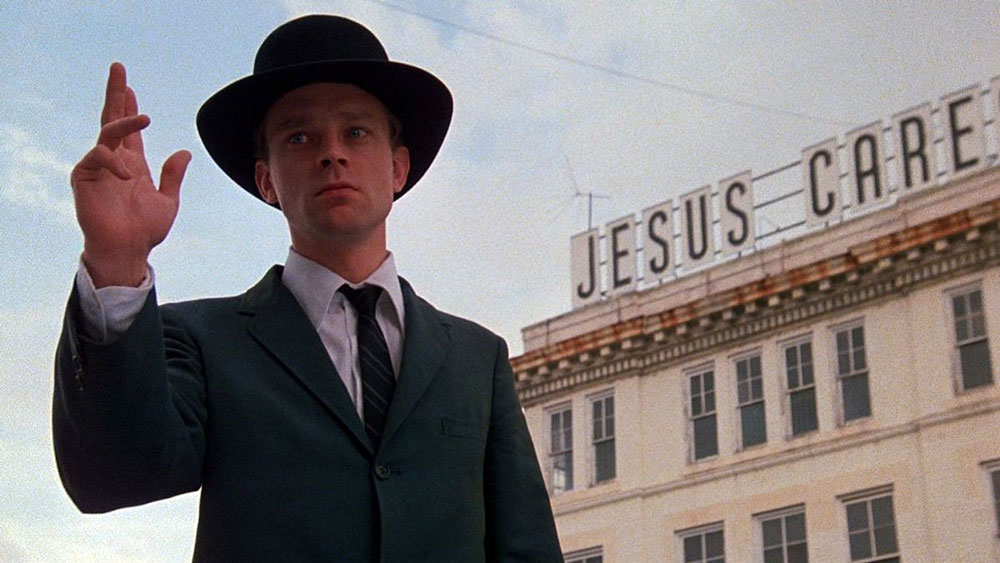Late and early styles meld in 1979’s Wise Blood, John Huston’s adaptation of Flannery O’Connor’s first novel. Brad Dourif plays Hazel Motes, the latest in a line of preachers who, disillusioned after returning home from his military service, picks an oppositional line of work. He takes to the streets of the fictional Southern town of Taulkinham to spread the antitheist gospel of a “Church Without Christ,” urging mostly unflapped passersby to reject organized religion and live their lives on their own terms. In O’Connor’s book, Hazel has explicitly come back from World War II, but the film exists in a hazier period, almost a paradigmatic Gothic South. The mood is set with an opening montage of still photographs consisting mostly of roadside signs–for towns, businesses, and places of worship, often with overlap, like the emblems for a Dairy Queen and a supermarket with a placard beseeching “Repent, Be baptized in Jesus’ name” beneath them.
Huston and the script by the brothers Michael and Benedict Fitzgerald sometimes lay the folksiness on a bit thick. (The brothers were babysat by O’Connor when they were young, when she lived for a time with the family. Their father, the legendary poet and translator Robert Fitzgerald, was executor of her estate.) The film’s early goings present multiple misspellings that aren’t in the book. Hazel writes a note warning anyone from looting his “shifferobe” and a tombstone says the interred has become “an angle.” Huston is even credited as “Jhon.” In general, there is a more whimsical, picaresque tone where the book was much darker; where O’Connor had a touched-in-the-head young man steal a gorilla suit from a traveling film promotion in a murderous nighttime hijacking, the film has him bloodlessly abscond with it during the day, replete with a twanging soundtrack.
That youth is Enoch Emory (Dan Shor), who lends the film its title by claiming he has a special intuition guided by a higher power, and who becomes one of the Church Without Christ’s few true believers, much to Hazel’s chagrin. Hazel has little luck in attracting a following. The story instead studies how his anti-religion develops many of qualities of that which he seeks to replace. There’s a fervent but uncomprehending disciple in Enoch. There are competitors: a street pastor faking blindness (a notably non-muted turn by the always-great Harry Dean Stanton) and a huckster (Ned Beatty, Biblically malevolent as he tempts Motes to turn his conviction into an enterprise). There’s a Mary Magdalene in the pastor’s daughter (Amy Wright). There’s even a holy infant, a ritually shrunken body from South America (troublingly, portrayed by an actual tsantsa borrowed from a university, which was later repatriated to Ecuador).
Wise Blood is screening at Anthology as part of its tribute to Dourif. A few years after his memorable debut in One Flew Over the Cuckoo’s Nest (1975), he reverses roles from a follower to a haphazard leader. He is remarkably well-suited to being an O’Connor protagonist, flailing through an uncaring world with only a half-formed idea of what he wants or believes. Dourif sometimes goes whole scenes without once unclenching his teeth. Hazel boils to a high dudgeon of irreligious resentment, spending the film’s final act finding ways to solemnly mortify his flesh in antagonism to the stupidity and/or inauthenticity that suffocates him. There is no “wise blood,” just our attempts to navigate the myriad befuddlements of life.
Wise Blood screens tonight, October 11, at Anthology Film Archives on 35mm as part of the series “Starring Brad Dourif.” Actor Brad Dourif will be in attendance.



